|
|
|
Sort Order |
|
|
|
Items / Page
|
|
|
|
|
|
|
| Srl | Item |
| 1 |
ID:
051558
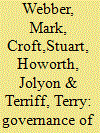

|
|
|
| 2 |
ID:
175446
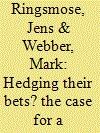

|
|
|
|
|
| Summary/Abstract |
President Donald Trump has adopted a critical position on NATO, raising concerns of an American abandonment of its obligations to Europe’s defence. The severity of Trump’s position is unusual, but some of his concerns are of long-standing and likely to be voiced in some form by his successor in the White House. American criticism and equivocation has led the European allies to engage in various forms of hedging. Some of these strategies are designed to keep the US attached to NATO; others bypass the alliance – cultivating either bilateral links to the US or a strengthening of EU defence cooperation. Hedging, whatever its form, is potentially damaging to alliance effectiveness and cohesion. In that light, NATO’s interests are better served by a strategy which builds upon the NATO-EU relationship and which advertises the benefits of European effort within NATO itself. To that end, we argue in favour of a reformulation of an old but much misunderstood idea – that of NATO’s “European pillar.” Here, existing contributions to European defence provided by the allies through NATO are crucial. Such an arrangement need not, therefore, entail any elaborate institutional engineering, but it does require political and strategic clarity.
|
|
|
|
|
|
|
|
|
|
|
|
|
|
|
|
| 3 |
ID:
108661
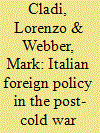

|
|
|
|
|
| Publication |
2011.
|
| Summary/Abstract |
Drawing on a neoclassical realist approach, this article analyses the foreign policy conduct of different Italian governments from 1994 to 2008. Pressured by the post-cold war international system, these governments have been compelled to raise Italy's profile within the international system. However, the way in which successive governments have responded has differed markedly. By looking at variables located at the domestic level - elite perceptions of the distribution of power and government instability - it is possible to explain these differences. Neo-classical realism is seen as an advance on Waltzian neo-realism precisely because it allows room for domestic as well as international (or systemic) variables, and because it has a very specific focus on foreign policy as such.
|
|
|
|
|
|
|
|
|
|
|
|
|
|
|
|
| 4 |
ID:
088641


|
|
|
|
|
| Publication |
2009.
|
| Summary/Abstract |
This article has four objectives: first to make a case for the significance of the Kosovo war in contemporary history; second, to present an overview of the crisis itself and the military confrontation which was its consequence; third, to survey the initial controversies aroused by military action-and, specifically, the debates surrounding NATO's Operation Allied Force; and finally, to reference the longer term significance of the Kosovo war in terms of the themes covered by the remaining contributions which make up this volume
|
|
|
|
|
|
|
|
|
|
|
|
|
|
|
|
| 5 |
ID:
088646


|
|
|
|
|
| Publication |
2009.
|
| Summary/Abstract |
NATO has throughout its history been the subject of prognostications of crisis and dissolution. Indeed, the alliance has been written off so many times that crisis as normality has come to typify its development. In the twenty-year history of NATO's post-Cold War development, Operation Allied Force stands midway between the existential moment that was the collapse of the Soviet bloc and the current travails being experienced in Afghanistan. A comparison of NATO's experience in the Balkans and in the Afghan theatre suggests that the view of a NATO perched permanently at the edge of collapse is problematic and misleading. This is not to defend alliance actions as such but rather to suggest that the narrative of crisis and collapse makes for poor analysis and underestimates NATO's proclivity for adaptation and endurance.
|
|
|
|
|
|
|
|
|
|
|
|
|
|
|
|
| 6 |
ID:
151569


|
|
|
|
|
| Summary/Abstract |
In securitisation theory (ST) little attention has been paid to how actors undertake securitisation collectively. The empirical focus of that theory has also, paradoxically, neglected the military-strategic sector and with it regional security organisations like NATO. Such an oversight is worth correcting for three reasons. First, NATO is constantly engaged in securitisation across a range of issues, a process that reflects an underappreciated recursive interaction between the Alliance and its member states. Second, the Ukraine crisis has resulted in Russia being explicitly identified as a source of threat and so has triggered a successful collective (re)securitisation by the Alliance. Third, a framework that demonstrates NATO’s standing as a securitising actor has potential relevance to other regional security organisations. This article discusses and amends ST in service of an approach that permits securitisation by actors other than the state, in this case NATO. A model of collective securitisation is presented and then applied empirically to the post-Cold War desecuritisation of Russia and its subsequent resecuritisation following the annexation of Crimea. The implications of resecuritisation for the emergence of a self-reinforcing security dilemma in NATO-Russia relations are also considered.
|
|
|
|
|
|
|
|
|
|
|
|
|
|
|
|
| 7 |
ID:
114739


|
|
|
|
|
| Publication |
2012.
|
| Summary/Abstract |
Afghanistan has provided NATO with its severest test of the post-Cold War period. The Alliance has set the end of 2014 as the target date for a withdrawal from combat operations and the consolidation of an Afghan lead in security provision throughout the country. It is an open question as to what the security situation will be once that crossroad is reached, but observation of progress since 2001 suggests that a lingering military stalemate is likely to persist unless and until a comprehensive political settlement is reached. NATO's ISAF operation has not, itself, had a mandate to affect a political solution, although its multiple efforts clearly impinge upon that goal. Meanwhile, NATO's operational mandate has proven extremely difficult to discharge. The Alliance has demonstrated a degree of flexibility in pursuing its mission, but has encountered a range of insurmountable obstacles - local, national and regional in origin.
|
|
|
|
|
|
|
|
|
|
|
|
|
|
|
|
| 8 |
ID:
133282
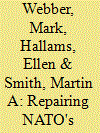

|
|
|
|
|
| Publication |
2014.
|
| Summary/Abstract |
NATO moves toward its next summit (to be held in Newport, Wales in September 2014) in a mood of anxiety and uncertainty. This is not simply because telling questions are being asked of the alliance in relation to Afghanistan and Ukraine, but because the twin motors which have sustained NATO now show signs of considerable wear and tear. The first of these motors relates to principles of purpose. This encompasses the activities (or purposes) which NATO has consciously pursued in the last 25 years: namely, operations, enlargement, partnership, transatlanticism and security. The second is principles of function: the means, in other words, by which NATO is kept in motion. Here, American leadership, cohesion and trust, burden-sharing and credibility all matter. These motors are not about to completely break down (NATO has underlying strengths which make that unlikely) but they do need attention. NATO's good health requires it to focus on a series of core tasks-what this article refers to as readiness, reassurance and renewal. These three tasks speak to an agenda of consolidation and preservation, rather than one of task expansion. But this is not a conservative agenda; grasping the nettle of prioritization and focus requires, in itself, a certain foresight and enterprise. Managed successfully, it is an agenda that will preserve and strengthen NATO in what are increasingly troubled times.
|
|
|
|
|
|
|
|
|
|
|
|
|
|
|
|
| 9 |
ID:
128233
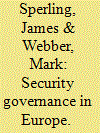

|
|
|
|
|
| Publication |
2014.
|
| Summary/Abstract |
The security governance literature has developed in four waves: the first is dedicated to matters of definition; the second to conceptual debate; the third to matters of application in the European setting and the fourth to how well the concept works in extra-European regions and at the global level. For all this effort, security governance as a concept remains problematic: it still has some way to go before it obtains clear definitional precision, conceptual clarity and a secure standing as concept in Security Studies. We address some of the theoretical and methodological difficulties common to the literature and argue that security governance has become overly preoccupied with agency and has thereby neglected structure. It has, in other words, obtained an actor-centered focus and so tended to conflate security governance as an analytical category with the specific actions of security actors. It has thus moved forward little in its ability to determine how and why security actors behave in the aggregate and whether that behavior reflects wider systemic properties. We thus ask in a third section whether it is worth returning to systemic thinking on security governance especially in the European context where the concept has had its most sophisticated application.
|
|
|
|
|
|
|
|
|
|
|
|
|
|
|
|
| 10 |
ID:
186546


|
|
|
|
|
| Summary/Abstract |
Since the Russian annexation of Crimea in 2014, NATO has returned to “its roots” (Pacuła 2021, 4). That reorientation has, of course, been sharpened further by the 2022 Ukraine crisis. Countering the Russian threat has once again become firmly established as NATO’s modus operandi (Schreer and Alberque 2022). For many commentators, this clarity of purpose is no bad thing. NATO had, so the argument runs, become over-stretched and ineffectual by taking on difficult missions such as that in Afghanistan where success was always ephemeral (Stapleton 2016). Better then, to concentrate on collective defense and deterrence – missions where NATO’s track-record is strong, its political-military assets well-established, and consensus clear (Ringsmose and Rynning 2021).
|
|
|
|
|
|
|
|
|
|
|
|
|
|
|
|
| 11 |
ID:
164991
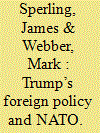

|
|
|
|
|
| Summary/Abstract |
Donald Trump assumed office in January 2017, committed to revamping US foreign policy and putting ‘America First’. The clear implication was that long-held international commitments would be sidelined where, in Trump’s view, the American interest was not being served. NATO, in the crosshairs of this approach, has managed to ride out much of the criticism Trump has levelled against it. Written off as ‘obsolete’ by the American president, it has fared better in the Trump era than many commentators had predicted. NATO exemplifies a tendency in US foreign policy, which pre-dates Trump, where open criticism stops short of abandonment. This pattern has continued since 2017 and indicates a preference for voice over exit. As such, it suggests that Trump’s foreign policy is not always as illogical as many have assumed. Logic is borne of institutional context: Trump has chosen to articulate voice where institutionalisation makes exit unviable. Institutional resilience in general and NATO’s case specifically has a wider relevance, both for transatlantic relations and international order.
|
|
|
|
|
|
|
|
|
|
|
|
|
|
|
|
|
|
|
|
|